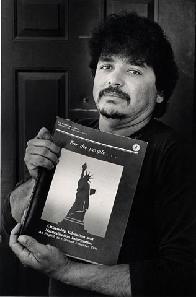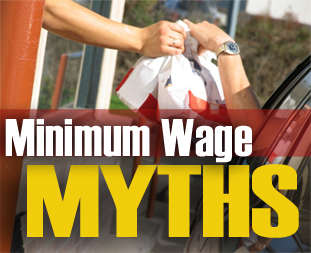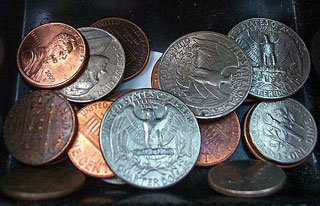
There are more signs that the wheels may be about to fall off the economy and the Federal Reserve seems a bit nervous about how to best insure that doesn't happen. The prevailing question at the moment centers on whether to continue the long string of rate hikes in order to keep inflation in check or to ease off in order to keep the economy rolling forward. Regardless, it now appears that consumer confidence has reached a level where spending is being voluntarily restrained in anticipation of leaner economic times. Bloomberg has two articles discussing the economy here and here.
Aug. 29 (Bloomberg) -- U.S. consumer confidence fell to a nine-month low in August as higher gasoline prices raised fears of inflation and a slowing housing market rattled Americans, a private survey showed.
Americans are restraining their spending, which makes up 70 percent of the economy, as gasoline prices are kept aloft by violence in the Middle East and a slowdown in the housing market makes them feel less affluent.
"The housing slowdown is an increasing drag'' on growth, said Zoltan Pozsar, an economist at Moody's Economy.com in West Chester, Pennsylvania. “That consumer and business confidence hold up as housing slows is crucial for the expansion.''
Frankly, one needn't be an economist to realize that if the housing market continues to slow, consumer confidence is going to weaken. Further, there are indications in a number of regions that housing prices may actually be dropping...a situation that will not only slow consumer confidence; it may well lead to a surge in foreclosures and bankruptcies and set into motion a scandal similar to the Savings & Loan debacle witnessed during the late 1980's.
"When you have a very visible strain in the economy like housing at present, something that probably won't break but just might, the Fed gives more weight to the potential for exponential losses,'' said Lou Crandall, chief economist at Wrightson ICAP LLC in Jersey City, New Jersey. "A policy shock would be more costly than usual at present.''
Minutes released today of the Federal Open Market Committee's Aug. 8 meeting, where interest rates were kept steady for the first time in two years, will likely show how worried policy makers are about a property downturn versus the dangers of accelerating inflation.
Unfortunately, it may be a case of over optimism to presume that the Federal Reserve's monetary policy can fully manage the factors that drive the U.S. economy...a belief that gained credence during the Greenspan years...a period of relative stability. Economic problems can easily spiral out of control as it is virtually impossible to isolate the influence of one economic segment from the remaining segments. Further, housing may well be the single most influential segment...one capable of triggering exponential ramifications.
Here's a plausible equation. If one assumes that the backlog of unsold homes continues to expand, there will be pressure to reduce home prices as those homeowners in financial difficulty are forced to cut their losses. Once that process begins, there is a potential for a dramatic drop in home values. As that happens, more and more homeowners...who have been allowed to borrow up to 125% of the value of their homes or have adjustable rate mortgages or interest only mortgages that convert to interest and principle mortgages within a specified period of time...find themselves in untenable situations.
While I can't provide hard data, it seems anecdotally accurate to conclude that the prevalence of short term mortgage products...loans that aren't fixed for a full 25 to 30 year period...makes more and more homeowners vulnerable to fluctuations within the economy and the housing market. Large numbers of homeowners have grown comfortable with refinancing to new mortgage products every few years. They have come to assume that there will be acceptable and favorable mortgage products available each time they need to refinance.
Unfortunately, as soon as the housing market begins to demonstrate instability...in the form of rising inventories, reduced construction, declining prices, or a higher incidence of foreclosures, the available products become much more conservative as well as longer term...a move necessitated by the inability to predict consumer success in the short term...and therefore a stable and successful lending portfolio for lending entities.
As homeowners realize that they may be unable to obtain favorable mortgage terms, those who conclude they won't be able to sustain the trend begin to look at selling their homes in order to relocate to lower priced housing. They immediately exert further downward pressure on the housing market as it becomes a race to get homes sold in anticipation of the trend...and that will undoubtedly lead to further reductions in home prices and therefore values.
Once housing prices begin to fall, the condominium industry is placed in danger. That happens because a greater percentage of condominiums aren't owner occupied as they were frequently first homes for many buyers who have ridden the housing boom into larger homes...often renting out their condos in a market of rising rental rates...able to cover the mortgage costs by virtue of the rent received. Additionally, many of these owners have refinanced their condominiums in order to pull out available equity in order to fund the purchase of larger, more expensive homes or to simply use the equity to purchase expendable products like automobiles, furniture, and other discretionary items.
As housing prices fall, condo values drop even faster as does the rent one can charge. Frequently, homeowners will attempt to unload rental properties first which then begins to impact apartment rental rates. As condo rental prices drop, apartments are forced to compete and the downward rental rate pressure is increased.
Clearly, one can see the domino effect that takes place once the housing market stalls. One must immediately examine construction activity once housing begins to decline. Obviously, if housing starts decline, jobs will be lost and unemployment will increase. Troubling as that may be, it gets worse. Frequently in a housing boom, the final push is to build more condominiums and apartments in order to provide lower priced housing to those who may be entering the market for the first time. Unfortunately, these projects are often funded and built upon the basis of pro-forma rents that won't be sustained in a housing slowdown.
As home prices decline, so do rental prices...creating circumstances whereby new condo and apartment properties cannot meet their debt structure which was based upon optimistic rental rates. They are also forced to compete with individual home rental rates as more and more homes hit the rental market at lower and lower rates.
The end result is often disastrous for lenders. Not only are there growing defaults on individual mortgages, they frequently see failures on large project loans (apartments and condominium projects). Lenders become increasingly cautious and money becomes more difficult to borrow. That practice limits small business lending and venture capital which now begins to impact the larger economy and the job industry.
Given that small business growth is largely responsible for job growth, a reduction in small business lending will frequently lead to expanding unemployment rates. Fewer jobs tends to put more homeowners out of work which only further accelerates downward pressure on housing prices as unemployed homeowners are forced to dump homes at lower prices in order to avoid foreclosures or bankruptcies. In essence, the repetitive downward spiral is self perpetuating until such time as the bottom is reached and the recovery cycle begins anew.
Fed forecasts presented to Congress last month predicted that inflation will hover around 2 percent to 2.25 percent next year -- a level that's higher than what some policy makers, including Chairman Ben S. Bernanke, have said is desirable. Bernanke added that inflation will probably recede in 2008.
Bernanke, 52, told Congress last month that rate changes take some time to work their way through the economy and that a housing downturn posed a risk to growth. He said in March 2005 that his comfort zone for inflation excluding food and energy was 1 percent to 2 percent, a range he hasn't disavowed since becoming Fed chairman this year.
"I am increasingly getting the feeling that is on the low side,'' said Richard Berner, chief U.S. economist at Morgan Stanley in New York. "The Fed may implicitly be choosing a slightly higher inflation objective than previously thought.''
It now takes a bigger increase in unemployment to bring inflation down by one percentage point, an equation economists refer to as the sacrifice ratio. A prolonged slump in housing may also have a large impact on household spending decisions; economists at Merrill Lynch & Co. estimate housing contributed 2 percentage points to growth, or about 60 percent, over the last three years.
"There is no reason to hammer the economy to bring inflation down another half point,'' said James Glassman, senior economist at JPMorgan Securities Inc. in New York.
The strategy of letting inflation drift slowly lower has its own risks, economists note. The economic pain to lower inflation may be even higher.
It is clear that the economy sits more squarely on a tipping point than it has for some five years. One of the problems with economic policy is the inability to calculate the intangible aspects of that policy...such as the impact it may have upon consumer confidence and spending. The economic data we frequently see cited is not dissimilar to political polling information. It offers a snapshot of sentiment but it isn't necessarily a predictor of future sentiment or actions. Numerous other factors may influence consumer sentiment...a growing reality in an increasingly unstable environment filled with the uncertainty of the Iraq war, Middle East turmoil, and the fear of terrorism.
Americans' expectations for the inflation rate 12 months from now rose to 5.5 percent in August from 5.1 percent in July. It reached a high this year of 5.6 percent in May, the Conference Board's figures showed.
Consumers were less optimistic about the labor market six months from now, suggesting consumer spending may sag further after slowing in the second quarter.
The share of people expecting better employment opportunities in the next six months fell to 14 percent, from 14.3 percent. The proportion of people surveyed who expect their incomes to rise was 17.7 percent after 18.3 percent.
Economists watch confidence gauges for clues to the strength of consumer spending. Even so, spending and confidence haven't been closely correlated this year, said Lynn Reaser, Boston-based chief economist at the Investment Strategy Group at Bank of America.
In the end, responsibility for economic conditions must also be shared by political leaders. To the extent that conflicts around the world and their associated uncertainty shapes consumer confidence, those in positions of power must be mindful of the ramifications of their decisions and actions. One would be hard pressed to identify a recent historical example of such tenuous circumstances. That alone should be instructive to those currently in power and should they fail to heed the emerging warning signals we may well enter a position of economic instability that matches the political instability. Ironically, one year after Katrina, we may well be witnessing the makings of a perfect storm.
Daniel DiRito | August 29, 2006 | 8:44 AM |
link
| Comments (1)



Statistics rarely lie. Many Republicans and a number of pundits have questioned why economic growth (increased GDP) hasn't been met by consumer confidence or a widely held belief that the U.S. economy is strong. Many have called for the Republican Party to tout economic growth in their efforts to hold control of the House and the Senate but recent data from the Commerce and Labor Departments may provide the clues as to why it may not be a convincing argument with many voters. Read the full New York Times article here.
With the economy beginning to slow, the current expansion has a chance to become the first sustained period of economic growth since World War II that fails to offer a prolonged increase in real wages for most workers.
That situation is adding to fears among Republicans that the economy will hurt vulnerable incumbents in this year’s midterm elections even though overall growth has been healthy for much of the last five years.
Insert tax cuts for the wealthiest Americans and a favorable environment for large corporations and it shouldn't be difficult to understand why the average American feels left out of the most recent economic expansion. Perhaps this latest data will once and for all dispel the oft held Republican notion that trickle down economics will serve the interests of all Americans. While it may have led to some additional investment as well as some job growth, in the long run it concentrates more wealth in fewer hands at the expense of the average wage earner.
The median hourly wage for American workers has declined 2 percent since 2003, after factoring in inflation. The drop has been especially notable, economists say, because productivity — the amount that an average worker produces in an hour and the basic wellspring of a nation’s living standards — has risen steadily over the same period.
As a result, wages and salaries now make up the lowest share of the nation’s gross domestic product since the government began recording the data in 1947, while corporate profits have climbed to their highest share since the 1960’s. UBS, the investment bank, recently described the current period as “the golden era of profitability."
As one looks at the historical significance provided with this data, it is hard to ignore the magnitude of the Bush economic agenda. Further, it helps demonstrate the degree to which this administration has sought to influence the fundamental constructs of the U.S. economy as well as how successful they have been in that effort. Unfortunately, that may well limit the ability of Republican candidates to use the economy to advantage in November. The favorable numbers simply aren't there for the majority of Americans.
Earlier this month, the University of Michigan reported that consumer confidence had fallen sharply in recent months, with people’s expectations for the future now as downbeat as they were in 1992 and 1993, when the job market had not yet recovered from a recession.
“Some people who aren’t partisans say, ‘Yes, the economy’s pretty good, so why are people so agitated and anxious?’ " said Frank Luntz, a Republican campaign consultant. “The answer is they don’t feel it in their weekly paychecks."
In the first quarter of 2006, wages and salaries represented 45 percent of gross domestic product, down from almost 50 percent in the first quarter of 2001 and a record 53.6 percent in the first quarter of 1970, according to the Commerce Department. Each percentage point now equals about $132 billion.
Over the last year, the value of employee benefits has risen only 3.4 percent, while inflation has exceeded 4 percent, according to the Labor Department.
This data also suggests that Democrats can benefit from an emphasis on the need to address healthcare costs and the growing numbers of uninsured Americans. The growing shift of health insurance costs to employees continues to minimize the impact of wage increases, leaving the increases in take home wages relatively insignificant. Add in concerns about social security, failed pension plans, and the reduced influence of unions and one can see why many workers are hesitant about their economic future.
In another recent report on the boom in profits, economists at Goldman Sachs wrote, “The most important contributor to higher profit margins over the past five years has been a decline in labor’s share of national income." Low interest rates and the moderate cost of capital goods, like computers, have also played a role, though economists note that an economic slowdown could hurt profits in coming months.
What little optimism that has been present may have merely resulted from the favorable housing market and low interest rates...factors that allowed many Americans to draw upon home equity in order to keep pace with rising costs and insufficient wage increases. Should the housing market falter...and there have been recent indications that the decline has begun...one would expect even less economic confidence and potentially devastating consequences for many who have over borrowed or will be unable to sustain rising mortgage costs.
“There are two economies out there," Mr. Cook, the political analyst, said. “One has been just white hot, going great guns. Those are the people who have benefited from globalization, technology, greater productivity and higher corporate earnings.
“And then there’s the working stiffs,’’ he added, “who just don’t feel like they’re getting ahead despite the fact that they’re working very hard. And there are a lot more people in that group than the other group."
In 2004, the top 1 percent of earners — a group that includes many chief executives — received 11.2 percent of all wage income, up from 8.7 percent a decade earlier and less than 6 percent three decades ago, according to Emmanuel Saez and Thomas Piketty, economists who analyzed the tax data.
But in a sign that Republicans may be growing concerned about the public’s mood, the new Treasury secretary, Henry M. Paulson Jr., adopted a somewhat different tone from Mr. Bush in his first major speech, delivered early this month.
“Many aren’t seeing significant increases in their take-home pay," Mr. Paulson said. “Their increases in wages are being eaten up by high energy prices and rising health care costs, among others."
As we approach November, should the economic indicators continue to create doubt, Republicans may find themselves with little to offer along the campaign trail. Assuming that economic growth, expressed in terms of GDP increases, will be sufficient to hold off Democratic gains may prove to be another miscalculation on the part of the GOP. In an election cycle that seems to be shaping up to be a "throw the bums out" mentality, economic declines may well be the final straw.
Daniel DiRito | August 28, 2006 | 7:56 AM |
link
| Comments (1)



The latest statistics on the housing industry suggest a dangerous turn of events that may have significant implications for the U.S. economy. I've long been concerned that recent economic strength has been predicated upon the implementation of a period of artificially low interest rates and an acceleration of adjustable rate and interest only mortgages. While the Federal Reserve may have succeeded in reducing the depth of the last recessionary period through the manipulation of interest rates, it may have simply been a period of deficit spending by both the government and the average homeowner.
If the housing industry suffers a significant setback, I would expect to see a huge increase in foreclosures and possibly bankruptcies...a set of circumstances that would send the economy into an even deeper recession at a time when the government is adding debt at an alarming and unprecedented rate. Read the full New York Times article here.
The National Association of Realtors reported today that purchases fell 4.1 percent last month to an annual rate of 6.3 million homes, the slowest since late 2003. The rate was 11.2 percent higher a year earlier.
At the same time, the inventory of unsold homes on the market swelled to a 7.3-month supply, the most in more than a decade.
The national median price of a sold home held steady in July at $230,000. But the association said that prices fell in most areas of the country, and in many places are now lower than a year earlier.
Adding to my concerns is the recent phenomenon that allows homeowners to borrow not only the full value of their home but in many cases up to 125% of the value. Allowing such borrowing positions many homeowners for disaster should housing prices fall...especially if they have adjustable rate mortgages or find themselves in a situation that they need to sell their home. The possible domino effect of such a situation is staggering.
When combined with other recent statistics showing falling real estate investment and fewer application for building permits, the sales figures today make clear that a housing slowdown is now under way. Most economists, including Federal Reserve chairman Ben S. Bernanke, still expect the slowdown to be orderly. But it remains to be seen just how far home sales will slide in the coming months and what the impact on the economy will be.
Economic expansion in the second quarter slowed to a 2.5 percent annual rate, down from 5.6 percent in the first quarter. Because housing has been so central to the overall health of the nation’s economy in recent years, forecasters are concerned that a steep decline in home sales may help push the economy into a recession.
Despite predictions that the slowdown will be manageable, it isn't difficult to imagine circumstances that could create a period of deflation. There are few recent historical comparisons where we have seen an economy fueled largely by equity borrowing amidst the lowest interest rates in decades. As such, it seems highly speculative to predict the impact of a housing bust following such a convergence of favorably manipulated events. There is little doubt that much of the recent economic success has been fueled by record equity borrowing and consumer debt.
The margin of error...or the ability of consumers to withstand a slowdown...has been cut quite thin by this administrations economic policy. At the same time, the country continues to see record deficits and should we fail to sustain reasonable economic growth (GDP increases), we may well see accelerated debt accompanied by declining revenues...a perfect storm for recession as well as deflation.
Daniel DiRito | August 23, 2006 | 8:30 PM |
link
| Comments (2)


I wrote the following poem, Eden's End, some time back after focusing on the many people one sees on the roadside with signs asking for money because they are without work or homeless or any number of other reasons. I've read articles that a number of these individuals actually do this for a living. I've also read that many of them are in fact homeless and suffer from addictions or mental illnesses. There is a tendency to assume the worst and doing so usually provides the rationale to ignore their requests and drive on without acknowledging their presence.
The other day I was driving around and came upon a stoplight at which a young woman was standing with a sign that simply said "Need Help". What caught my eye was the fact that she was wiping tears from her red face as she stood on the corner. It looked to me that she must have been crying for a while. I was in the second lane and I watched a car ahead of me in the lane closest to the curb roll down the window and hand her some money. While I reached for my wallet, the light changed but I was determined to give her some money so I remained stopped as she ran towards the car while avoiding the traffic. I handed her the money and she thanked me profusely. I said good luck and moved on.
It made me think about this poem and this photo I took while in Vienna. They seemed to be a perfect match for this posting since we often hope others will see us and see our need for a kind word or a warm smile or just an acknowledgment that we exist. In a world that is often cold and callous, it’s a shame that those in need are often overlooked. I'm reminded of the images from New Orleans during Katrina. Perhaps we should all be more mindful of those in need.

EDEN’S END
Alley ways and cardboard castles
Vagrants vanquished by life’s hassles
Treasures kept in grocery baskets
Empty lives to fill the caskets
Jacked around, Jack Daniels downed
The story’s broken, without a sound
Lying motionless on the ground
A message scribbled to get a buck
Hungry and homeless and out of luck
The passers by eat their apple pie
The American dream drives on by
Heroin highs, while the heroine cries
Darkness dwells, where once were eyes
Death is hidden in life’s disguise
Crack the window, give them five
You did your part, and off you drive
Raise your glass, let’s have a toast
You looked around, you did the most
The beggar begs, you beg their pardon
Just turn your head, the heart will harden
The seeds are dead, and soon the garden
Daniel DiRito | August 21, 2006 | 11:20 AM |
link
| Comments (0)



The Congressional Budget Office reports an expected deficit of 1.76 trillion dollars over the next decade...but that assumes that the President's tax cuts will not be made permanent. If those tax cuts were to be extended permanently, the deficit would grow by more than twice that amount. Read the full Associated Press article here.
The $260 billion deficit forecast for the current budget year, which ends Sept. 30, is $112 billion below the office's last estimate, in March.
But the CBO forecast the improvement as short-lived, projecting the gap between revenues and spending will rise to $286 billion in 2007 and total $1.76 trillion over the next decade.
The deficit picture, according to the CBO, would be even worse if Bush succeeds with a top domestic priority, persuading Congress to make permanent the tax cuts of his first term. They are scheduled to expire at the end of 2010.
Extending the cuts through 2016 would add $2.2 trillion to the deficit. The cost would climb to $3.26 trillion if a permanent fix is made to the alternative minimum tax, which is designed for the wealthy but is ensnaring more middle-income taxpayers.
Looking beyond these numbers offers little encouragement as the country will experience a higher percentage of elderly individuals in the coming years as baby boomers retire and the social security and Medicare system are further stretched and stressed. While the GOP has argued that the tax cuts have spurred economic growth, there is little evidence to suggest that the gains would be sufficient to overcome the anticipated revenue shortages.
One is left to wonder at what point Americans will realize that deficit spending will eventually have to cease...which may be accompanied by the need to generate additional revenues in the form of tax increases or significant cuts in social services, including the Social Security system. Perhaps the less than favorable polling on the economy indicates that Americans realize a reckoning is in the offing.
Daniel DiRito | August 17, 2006 | 5:02 PM |
link
| Comments (0)



In another sign that Democrats may be positioned to make gains in November, the Census Bureau released new data that immigrant population now tops 35 million and has expanded in 49 states. Nearly 17 million of those immigrants are Hispanic. Immigrants now comprise over 12 percent of the U.S. population. Read the full Reuters article on the immigrant numbers here and the full Associated Press article on the 49 state expansion of immigrant populations here.
From Reuters:
WASHINGTON (Reuters) - The number of immigrants living in the United States has risen to more than 35 million, or 12.4 percent of the population from 11.1 percent five years ago, according to figures released by the U.S. Census Bureau on Tuesday.
California had the most people born outside of the United States at 27.2 percent of its population.
Some of the findings were surprising...especially the areas identified with the largest immigrant population increases. The findings provide a picture of just how widespread immigration has become and the draw that employment opportunities provide regardless of location.
From The Associated Press:
“This is just an extraordinary explosion of diversity all across the United States," said William Frey, a demographer at the Brookings Institution, a Washington think tank. “It’s diversity and immigration going hand in hand."
Frey said states that attract large numbers of immigrants can consider it a “badge of economic success." There have, however, been backlashes.
“In some places it will be awhile before they are accepted by the locals," Frey said. “All we have to do is look at this immigration debate."
South Carolina’s immigrant population grew by 47 percent since 2000, more than any other state. Hispanics grew by 48 percent in Arkansas, the most of any state.
Michael MacFarlane, South Carolina’s state demographer, said immigrants and Hispanics were attracted by a healthy economy that offered jobs requiring few skills.
The rapid growth likely explains some of the heightened interest that immigration has attracted leading into the November midterm elections. It will be interesting to see how the issue plays in the 2006 midterm election as both the DNC and the RNC attempt to lure immigrant voter support while still addressing the border issue. Some within the GOP have concluded that a strong position on illegal immigration may be a better position for the Party than courting minority voters.
The dynamic nature of the issue along with differing regional reactions makes the topic complex and controversial. The recent congressional race in the San Diego area (CA-50) seemed to indicate that a strong position on halting illegal immigration worked to the advantage of the GOP candidate. Nonetheless, it may not signal that the same approach will be beneficial in all locations. What is certain is that immigration will remain a topic of interest and a growing political factor for years to come.
Daniel DiRito | August 15, 2006 | 11:48 AM |
link
| Comments (0)



The myth that raising the minimum wage will hurt low income wage earners by hindering job growth is being met with increasing skepticism. The rationale that it is better to pay millions of Americans poverty level wages than to increase that wage because it might not create more jobs is not only counterintuitive, it is absurd. Bloomberg has the full story here.
A moderate increase in the minimum wage won't raise unemployment among low-skilled workers, according to recent studies, many economists say. They are joined by some business executives who say they can live with that, especially if it's coupled with tax relief.
I find it ironic that business executives have suddenly decided that a wage increase might be a good thing when it is tied to a decrease in the estate tax. Clearly, if they now favor the minimum wage increase, one can assume that the Republican tax giveaways had to exceed the potential increase in costs...once again reinforcing the Republican propensity to shower more wealth on those who already hold the lions share.
A turning point in the debate came in the 1990s as states such as New Jersey began boosting their mandated wages above the federal level.
In 1995, Princeton economists David Card and Alan Krueger published research on unemployment trends among fast-food restaurants in New Jersey and neighboring Pennsylvania. They found that the number of jobs rose in New Jersey compared with Pennsylvania, even though New Jersey had a higher minimum wage.
The study, while not perfect, "provided evidence that went against the common view,'' Solow says."It changed the way many economists look at minimum wage.''
Explanations include cost savings from reduced job turnover, increased productivity as a result of better worker morale and the attraction of higher-quality employees through higher wages, Blinder says.
Frankly, the fact that experts are just beginning to acknowledge the fact that employee morale, turnover, and productivity might be tied to wages is mind-boggling. If it makes sense to pay CEO's huge salaries to turn around the performance of a struggling company, why wouldn't it also make sense that low wage employees can be similarly motivated...and likely have a much greater impact on a successful company turnaround?
A boost in the minimum wage would benefit about 15 million people, according to the Economic Policy Institute, a Washington research group partially funded by labor unions. Jared Bernstein, a senior economist at the institute, estimates that the average minimum-wage worker generates 54 percent of his or her family's total weekly earnings.
"The social consequences of raising the wage have become increasingly important,'' says Nobel Prize-winning economist Joseph Stiglitz, former chief economist for the World Bank in Washington and now a professor at Columbia University in New York.
We hear politicians talking about the benefits of programs to provide opportunities for underprivileged children and yet they fail to make the socioeconomic connections related to a minimum wage increase. If education is important to upward mobility, it certainly follows that a stable home environment (enough money to function) will impact the likelihood that children from poor families can obtain the full benefit that education offers. Is there any doubt that dropout and crime rates are linked to poverty? Frankly, it’s about time that some measure of honesty is being applied to this issue. Hopefully a bill that is actually focused on the interests of low wage families can be passed in the near future.
Daniel DiRito | August 7, 2006 | 1:47 PM |
link
| Comments (0)



In another defeat for Bill Frist, Democrats were able to stop the passage of a GOP bill intended to give huge tax breaks to wealthy Americans and take the important minimum wage issue off the table prior to November's midterm election. Frist and fellow Republicans had enhanced the bill with a number of enticements in hopes of drawing the needed Democrats to pass the bill. In a sign of strength and unity, the Democrats held ranks and the measure failed. The Washington Post has the full story here.
Under the bill, "8,100 of the wealthy and well-off hit the jackpot, while millions of working families get $800 billion in [federal] debt," said Minority Leader Harry M. Reid (D-Nev.), who led the opposition to the measure.
Frist agreed to the deal, hoping that several Democrats could not resist a chance to raise the minimum wage, in three phases, to $7.25 an hour from the current $5.15. The bill would also have exempted from taxation all estates worth as much as $5 million -- or $10 million for a married couple -- and applied a 15 percent tax rate to inheritances above that threshold and up to $25 million. The value of estates exceeding $25 million would have been taxed at 30 percent.
Gerald W. McEntee, president of the American Federation of State, County and Municipal Employees (AFSCME), said, "This was a transparent attempt to dangle a minimum-wage increase for families struggling to make ends meet to secure yet another Texas-size tax handout for the wealthiest."
"Under the Republican bill, Paris Hilton and her family will get $250 million, while the tipped workers in Hilton hotels will lose up to $5.50 an hour," said Sen. Edward M. Kennedy (D-Mass.).
The defeat provides Democrats further ammunition to assert that this has been a "do nothing Congress" under Republican control. Aside from efforts to funnel tax cuts to the wealthiest Americans, Republicans have little to boast about as they campaign to retain control of the House and Senate. Frist and the Bush administration suffered setbacks on a number of issues including Social Security and immigration reform. Hopefully Democrats can use the defeats to devise a clear and succinct message that will propel them into a position of power in November.
Daniel DiRito | August 4, 2006 | 7:38 AM |
link
| Comments (2)



![]()
![]()






